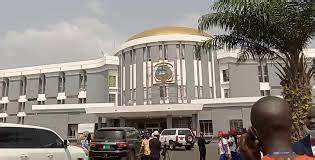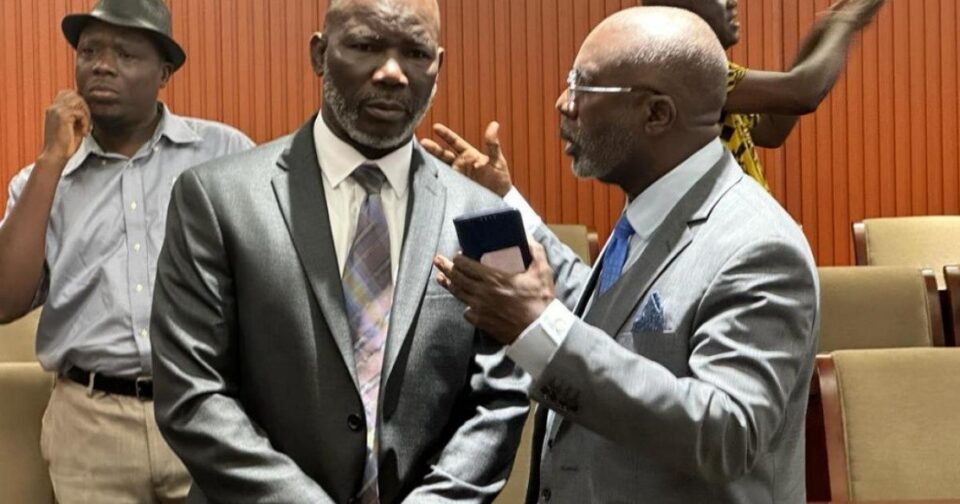PHOTO: (L-R) R) “Minority bloc” Speaker Richard Koon and embattled House Speaker, Cllr. Fonati Koffa
By Hun-Bu Tulay
Cell#231-777-111-032/886-517-356; Email: ntevoma@gmail.com
The Constitutional Framework of Liberia
Chapter 1, Article 3 of the Liberian Constitution declares: “Liberia is a unitary sovereign state divided into counties for administrative purposes.” This foundational principle establishes a Republic built on three co-equal branches–Legislative, Executive, and Judiciary; each designed to uphold democracy through separation of powers and checks and balances.
- The Legislative Branch crafts laws, represents the people, and oversees government actions.
- The Executive Branch, led by the President, enforces laws and steers national policy.
- The Judiciary, headed by the Supreme Court, interprets laws and safeguards constitutional rights.
This balance ensures stability, but when one branch falters, the others must act decisively to preserve democracy.
The Judiciary: Guardian of the Rule of Law
The judiciary serves as the cornerstone of justice by interpreting laws, invalidating unconstitutional statutes, and safeguarding citizens’ rights. An independent and impartial Judiciary fosters public trust, attracts foreign investment, and ensures sustainable national development.
Liberia’s Current Challenge: Upholding Judicial Authority
In Liberia’s recent political crisis, the Supreme Court issued a decisive ruling on December 6, 2024, clarifying constitutional procedures for legislative operations. However, some officials, whether due to a lack of legal understanding or personal interests, have disregarded this ruling. This defiance has led to significant consequences, including financial losses and the tragic burning of the Capitol Building, the seat of Liberia’s Legislature.
Funds diverted to luxury accommodations (such as RLJ and Farmington Hotels) and the costly reconstruction of the Capitol could have been better allocated to critical sectors like healthcare, education, and infrastructure development.

Threats to the Rule of Law
The Rule of Law is undermined when:
- Executive officials openly challenge judicial rulings, weakening governance and institutional integrity.
The Ministry of Justice misinterprets court decisions, creating confusion and fostering noncompliance.
At the onset of the crisis, the Liberian Senate initially stated that it would not align with the Majority Bloc. However, this position was reversed after the Minister of Justice provided his interpretation of the ruling. In one of our earlier features, we argued that the Minister of Justice does not have the authority to issue binding interpretations on Supreme Court rulings and that only the Court itself can provide an authoritative legal interpretation. However, our stance was corrected by the Supreme Court’s April 23, 2025, ruling, which contradicted the Justice Minister’s 2024 interpretation.
- Leaders prioritize political or personal interests over constitutional obligations, eroding public trust.
The Supreme Court’s Final Authority
The Supreme Court’s rulings are final and binding. Any attempt to distort or disregard its decisions constitutes an attack on Liberia’s democracy. The Court’s opinions particularly regarding the House of Representatives crisis have been clear and unambiguous.
In basic education, students are taught that if they encounter an unfamiliar word while reading, they should pause and define it. Unfortunately, in 2025 Liberia, this fundamental principle seems forgotten. Many individuals, including government officials, misinterpret legal texts, leading to flawed conclusions.
Misinterpretations of Recent Supreme Court Rulings
Some have falsely claimed that the Supreme Court’s rulings invalidate all legislative actions (such as the 2025 Budget, ratified treaties, and passed laws) by the Majority Bloc. This is incorrect.
A careful reading of the Court’s opinions reveals no such sweeping nullification.
Key Rulings Analyzed:
- December 6, 2024, Ruling:
- The Court mandated that the House of Representatives must operate in compliance with Articles 33 and 49 of Liberia’s Constitution.
- It explicitly stated: “Any sitting not in conformity with these Articles is Ultra Vires (Unconstitutional). Go back and act accordingly.”
- The Court even provided the definition of Ultra Vires meaning actions beyond legal authority to prevent misinterpretation.
- April 23, 2025, Ruling:
- The Supreme Court reaffirmed J. Fonati Koffa as the legitimate Speaker of the House of Representatives.
- At no point did the Court declare past legislative actions illegal or void.
Conclusion: Respecting Judicial Clarity
It is important to recall that the case before the Supreme Court pertain solely to the unconstitutional removal of J. Konati Koffa, not the constitutionality of the National Budget or any other legislative enactment. Consequently, the Court would not have ruled on an issue that was not properly before it.”
The Supreme Court’s rulings were measured and precise. There is no clause in either opinion that retroactively nullifies legislative proceedings. Public officials and citizens alike must refrain from imposing personal interpretations on judicial decisions.
Liberia’s progress depends on respecting the Rule of Law, upholding judicial authority, and ensuring accountability. The Judiciary has spoken. It is now the duty of all branches of government and the citizenry to comply.
A Call to Action: Restoring Liberia’s Democratic Integrity
- President Boakai Must Act. If legacy matters, swift enforcement of the Supreme Court’s rulings is non-negotiable.
- If President Boakai fails to enforce this Supreme Court ruling, will he have the resolve to uphold any judicial decisions in the future? This calls to mind Justice J. J. Dossen’s landmark 1948 opinion, in which he affirmed that Liberia’s Constitution, statutory laws, and international treaties place all individuals on equal footing before the law. Prior to this ruling, legal interpretations often varied depending on the parties involved in a dispute.
- Mr. President, we must not revert to the pre-1948 era where justice was selective. Upholding the rule of law is not optional, it is a fundamental duty of your office.”
- The Justice Minister Must Step Down – Misinterpreting the Court’s decision breaches public trust. Resign or be dismissed.
- The Legislature Must Exercise Oversight – Hold the Executive accountable for any defiance of judicial authority.
Liberia cannot afford lawlessness. The Constitution is not a suggestion; it is the supreme law. Those who defy it must face consequences.
Stop the madness. Uphold the Rule of Law.

